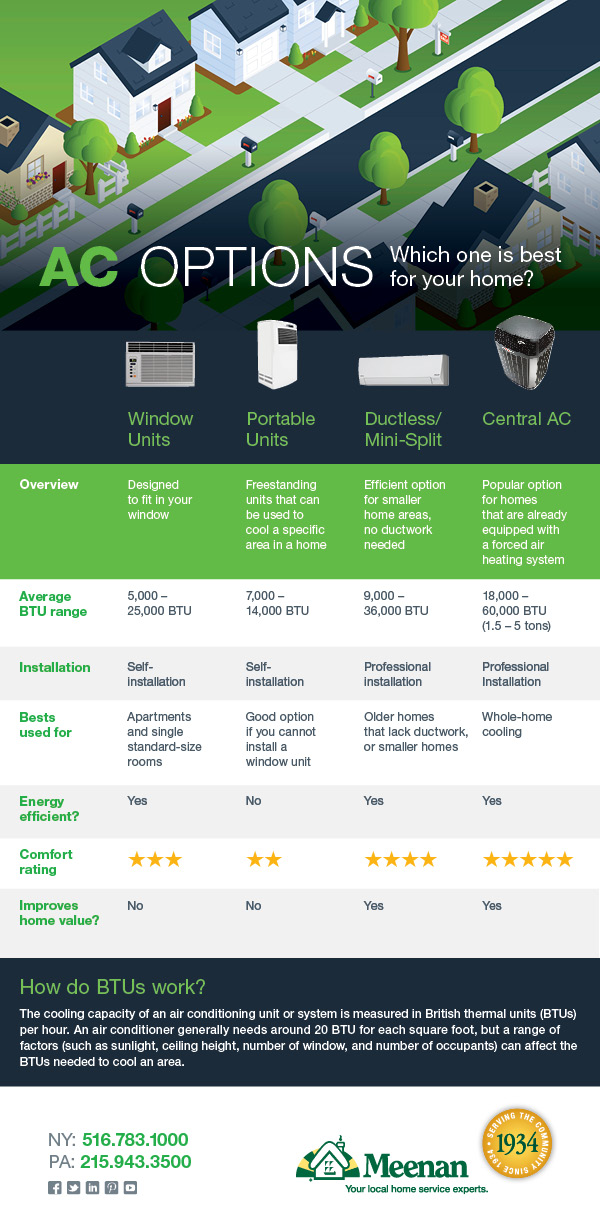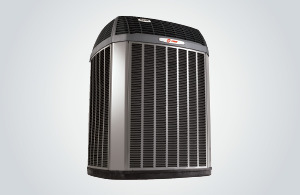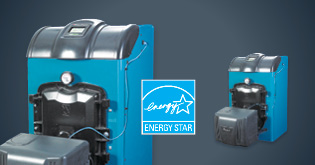
Compare the best air conditioning system options for your home.

Just about everyone requires air conditioning to handle the heat and humidity of summer in our climate. But which AC system is right for you and your home? Before making the decision about which option is right for you, it’s prudent to think about the pros and cons of each unit or system.
There are four main types of home air conditioning units and systems that function on the principle of removing heat but when it comes to efficiency levels, design, and the ability to provide comfort, results can vary.

Window AC units.
Designed to fit in double- and single-hung windows these are normally used in apartments or homes with no central air conditioning.
Window AC advantages:
- Relatively small, fairly portable, and easy-to-install without calling in the professionals.
- Most likely the cheapest AC option for your home, if budget is an issue.
- Current units are up to 30% more efficient than those manufactured just 10 years ago.
- Normally come with up to five-year warranties.
Window AC disadvantages:
- Even if you live in an apartment, multiple units are required to keep every room comfortable, they will not cool an entire home.
- Obstructs views and impairs your ability to use windows.
- Are noisy, with the potential of having an AC compressor close to your bed.
- Heavy and may be challenging to install or take out for winter storage.
- High ceilings, lots of windows and doors, high sun exposure, and cooling a room on your home’s top floor may impair their efficiency.
Portable air conditioning units.
Similar to window units, these simply stand on the floor, drawing in air, removing heat and moisture, and venting cool, dry air back into your home. Hot, humid air is removed through an exhaust hose, which must be placed out through a window. These units are only a better option to window units if you cannot lift heavy window units or if window size won’t accommodate a window unit.
Portable air conditioning advantages:
- Set up is easier than window units.
- Easy to position as they move on casters.
- Views are not blocked and removing the hose is easy if you need to use a window.
Portable air conditioning disadvantages:
- Tend to deliver only half the cooling capacity that they claim.
- More expensive and less efficient than similarly sized window units.
- Noisy and most units have water reservoirs that must be drained manually.
Ductless mini-split air conditioning systems.
With some models having the highest efficiency ratings of any type of AC system, a ductless mini-split AC system is basically a heat pump without ductwork and has two main components:
- An outdoor compressor, similar to those in central AC systems.
- An indoor evaporator coil and air handling unit that mounts to the wall or ceiling, linked by a conduit that goes through a sealed hole in the wall.
Ductless mini-split AC systems are ideal for older homes with no ductwork and smaller homes and add-ons where adding ductwork isn’t feasible.
Ductless mini-split air conditioning advantages:
- Provide flexible cooling to individual parts of your home.
- Compact/small size and energy-efficient operation.
- Closest you can get to central air conditioning without installing ductwork.
- Since mini-splits are a type of heat pump, they can also function as a heater in colder weather.
- Much quieter than window or portable AC systems and run as quietly as an ordinary fan, since the compressor is located outside.
- Provide better home security and better views with no window required to function.
Ductless mini-split air conditioning disadvantages:
- More expensive than window or portable units.
- Professional installation, including drilling a three-inch hole in the wall to link indoor and outdoor components, is required.
- You may have to consider interior design since the unit mounts to the wall or ceiling of any room.
Central air conditioning systems.
These systems deliver the most comprehensive home cooling solution. The system distributes cooled air through ductwork with return and supply registers in each room of the home. All system components are outside the house, except for the air handler, which is usually shared with the furnace. If you already have ductwork in your home, this is the best AC option.
Central air conditioning advantages:
- The most efficient way to keep your whole house cool and comfortable.
- Provides better indoor comfort, cooler temperatures, and lower humidity.
- The latest systems are more energy-efficient than ever.
- It’s a virtually invisible and silent way of cooling your home since practically all components are outside.
- If you have ductwork, installation is pretty straightforward but still must be done by professionals.
- It truly is an investment that adds value to your home.
Central air conditioning disadvantages:
- Annual tune-ups and maintenance is required for these systems to remain at their best and operate at peak efficiency.
- Upfront costs can be high, especially if you need ductwork. However, if you’re just replacing an existing central air conditioning system, the cost is cheaper than installing a new ductless mini-split AC system.
Remember…
Always consider the size of the AC system you need for your particular home:
- An undersized unit will not be able to keep up with cooling on the hottest days.
- An oversized unit will short cycle, wearing out parts faster, and won’t give the unit a chance to dehumidify the space.
Whether you’re installing a central or ductless mini-split system, a licensed professional contractor sizes the unit for you, to match your cooling needs. It’s always best to have any of these AC systems professionally installed.
 | Click here to view the latest offers on central air conditioning equipment |



.jpg?sfvrsn=59b4717f_1)
.jpg?sfvrsn=38eb02bb_5)